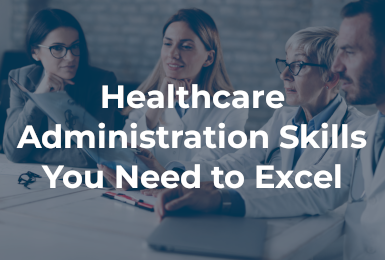Michael D. Zemany, MBA, FACHE currently serves as the Program Director and Assistant Professor for Champlain’s online healthcare administration programs. He has been with Champlain College Online (CCO) for 11 years.
Tell us a little bit about your professional background in healthcare.
I have worked in various roles within the healthcare arena for 40 years. First, in basic immunology research (my BS degree is in Chemistry from Clarkson University); then in community health, initially as Education Director, then as Executive Director for a regional EMS program; moving into Learning and Organizational Development positions; and then to senior executive roles (Chief Operating Officer) for acute and long-term healthcare organizations.
Early on, I also served as Program Director for Lifelong Learning at a community college for a few years. My MBA degree is from Walden University (so I have experienced online learning firsthand), with specializations in both Healthcare Systems Administration, and Strategic Human Resource Management. I am board certified in healthcare administration and am a Fellow of the American College of Healthcare Executives.
What brought you to Champlain?
My career had encompassed three key aspects considered to be important for the Program Director of the healthcare administration department, including significant experience as a:
- clinician and scientist
- senior healthcare leader
- adult educator
The prospect of leading Champlain’s new healthcare administration programs (they were just being developed at the time) was exciting as this would utilize the expertise I had developed in the prior 30 years working in the field of healthcare.
I was excited about being able to work with each student to discover the ways in which people, organizations, systems, and processes can be designed and managed to leverage the right combination of knowledge, skills, resources, and passionate dedication to create a positive impact on the health and wellbeing of many.
What are some of the things you like most about working at Champlain College Online?
Everyone at CCO shares my passion for students’ successes. Their ability to create innovative solutions to the challenges facing the healthcare field is my number one priority. The student-centered approach here is what makes Champlain so special. CCO is efficient and nimble, which are two characteristics I imagine our students appreciate greatly.
What do you think makes Champlain’s online healthcare administration programs valuable to students?
Both our undergraduate and graduate programs provide essential knowledge and skills that are required for healthcare leaders. Developed and taught by practitioners in healthcare, these programs are current, relevant, and directly related to improving healthcare delivery. Champlain’s coursework is directly applicable to the field of healthcare and the knowledge and skills developed can be immediately used to solve real-life workplace challenges.
What do you think makes a good online instructor?
A good online instructor needs to have industry-specific expertise and a solid understanding of how to educate and guide adult learners. Adult learners are unique. They know who they are, why they’re going back to school, and have an impressive commitment to keeping their eyes on the prize, no matter how far away they are from earning their degrees. I believe instructors need to have compassion and humility while helping adult learners reach the finish line, whether it’s their first degree or a graduate program.
What attracts you to teaching online?
I love the flexibility of teaching online. Simply knowing the work is important and will result in leveraging my expertise to benefit many who will improve healthcare delivery is reason enough to teach online adult learners.
Who do you see as being a good fit for our healthcare administration programs?
The target audience for these programs continues to be comprised of early to middle-managers and senior leaders (for the master’s in healthcare administration - a minimum of two years of experience) in any healthcare setting, who are interested in developing or augmenting a comprehensive understanding of management/leadership tools and skills, who need to increase efficiencies, cut costs, and improve outcomes for patients and providers. They seek to leverage the expertise of staff to create better outcomes in health in a sustainable way by being better people and resource managers, all in the face of restricted resources and oppressive regulations.
The bachelor’s and master’s degrees in healthcare administration at Champlain are designed to meet the needs of healthcare professionals working across a variety of healthcare organizations. Compared to other healthcare administration programs, Champlain sets itself apart from the competition by defining healthcare administration, not as a general set of skills, but as an array of pertinent and practical abilities and knowledge that is intertwined with context-specific quality and process improvement, human resources, finance, leadership, technical and information systems expertise, as well as innovation and design thinking, and data analytics.
What are some of the trends you see shaping healthcare administration education over the next few years, particularly in the online education space?
Significant challenges evident throughout the U.S. healthcare landscape remain largely unresolved, and the leaders of tomorrow will need new approaches if real advances are to be made in the healthcare delivery system. While tremendous effort has been applied to these issues for many years, with limited success, the methods used have been those that are familiar, those that seemingly worked when the system was much less complex, those that have only created a wildly complex, inefficient and woefully inadequate system, when compared to almost every other industrialized nation on the planet. Design thinking, applied in a manner that fosters true innovation, has not really been applied to these issues, and it may be what is needed to make sustainable progress in creating a healthcare system that provides real health and wellness for everyone.
Issues surrounding health information management also continue to plague the system, with limited interoperability, poorly managed data definitions, geopolitical roadblocks, and continuing delays. The management of data, and the ability to gain meaningful and actionable information from it, clearly remains an obstacle - one that must be overcome in order to gain any efficiency, especially as the volume of data continues to explode. The ability to use data analytics and visualization to make informed strategic decisions is, and will continue to be, a critical skill for healthcare administrators, and by engraining these concepts throughout the coursework, graduates of these programs will be well equipped to use “big data” to make well informed managerial and clinical decisions.
Champlain’s healthcare administration programs share an important mission: to graduate students who have the capability to manage for quality, high performance, and continuous improvement in any healthcare-related industry by employing their knowledge of leadership, management, performance improvement, innovation, and information systems. This mission is fulfilled through melding Champlain’s blend of andragogy, curriculum design, existing curriculum and online learning with the necessary healthcare-specific content that distinguishes the field of healthcare from other industries/sectors.
Download Program Guide
Learn what you can expect from our online bachelor's in healthcare administration program.

Download Program Guide
I acknowledge that, by clicking the "submit" button, I am giving my express written consent to Champlain College and its representatives to contact me about educational opportunities via email, text, or phone, at the phone number above, including my mobile phone, using an automatic dialer, or pre-recorded message. Message and data rates may apply. I understand that my consent is not a requirement for enrollment, and I may withdraw my consent at any time.







